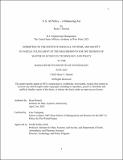U.S. AI Policy - A Balancing Act
Author(s)
Hetrick, Ryan T.
DownloadThesis PDF (14.11Mb)
Advisor
Videgaray, Luis
Terms of use
Metadata
Show full item recordAbstract
Artificial intelligence policy is emerging as a critical component of U.S. strategy and strategies for countries around the world. What type of AI policy will allow the United States to continue to lead the world in AI innovation while doing it in an ethical and responsible manner? This work compares and contrasts 13 different countries and how each government approaches innovation, regulation, government funding, and law scope in the field of artificial intelligence. A significant portion of this analysis evaluates the tradeoffs that come with AI policies and their effects on society. Considering these tradeoffs, the U.S. needs to ensure that innovation in the field of artificial intelligence remains the top priority, while at the same time balancing the ethical deployment of AI to protect U.S. citizens. With China on the heels of the United States in terms of artificial intelligence capabilities, the United States needs to innovate more in the fields of foundation models, generative AI, human machine interaction, natural language processing (NLP), computer vision, and other emerging areas of artificial intelligence as well.
This thesis takes an in-depth analysis of foundation models and generative artificial intelligence, while highlighting their importance and demonstrating their potential impact in the future. At the end of this body of work, there is a proposed Bill to U.S. lawmakers and Congress, titled “The Artificial Intelligence Startup, Innovation, Defense, Industry, and Academia Act (AI STIDIA Act)” that proposes a strategy for the United States to drive significant innovation in the field of artificial intelligence while deploying it in an ethical and responsible manner. The United States needs to prioritize ethical innovation in the field of artificial intelligence and cannot afford to emplace ineffective regulatory frameworks that curtails innovation. There will be a time when there is proper technology to extensively regulate artificial intelligence; however, there is not sufficient technology to extensively regulate AI as I publish this thesis. As the United States aims to generate the most innovative AI systems and create a culture that encourages the ethical deployment of AI, we should learn from past successes and failures when innovating technology. The United States needs to focus on creating AI technologies that enhances the wellbeing of U.S. citizens and people around the world.
Date issued
2023-06Department
Massachusetts Institute of Technology. Institute for Data, Systems, and SocietyPublisher
Massachusetts Institute of Technology